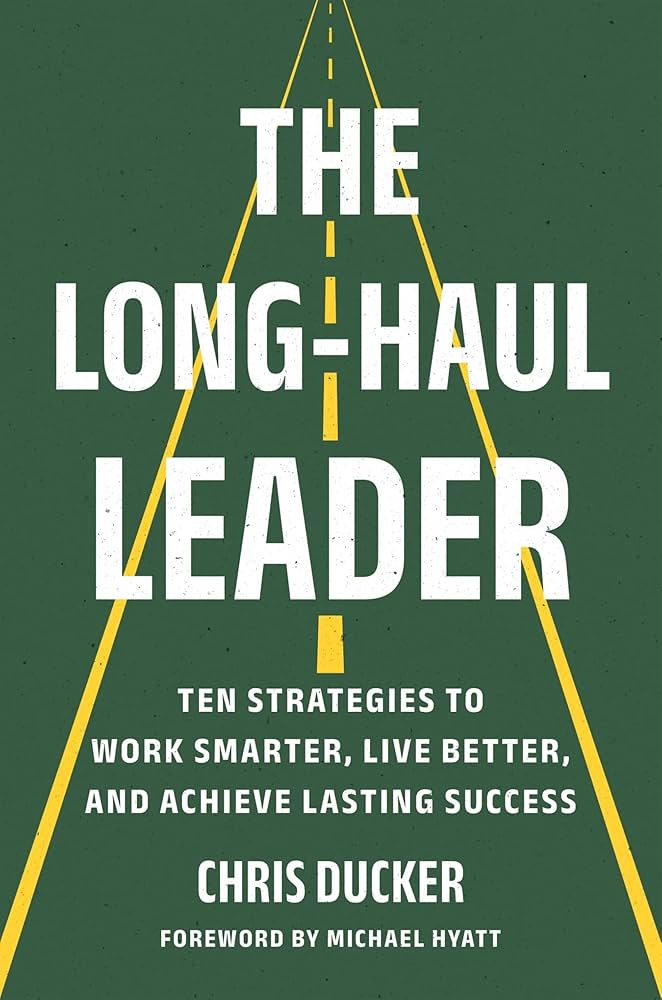Books Get Written in Sprints (Not Marathons)
And Other Updates
Hi there. First of all, I’ve got a few updates.

Last week, my client Chris Ducker’s book The Long-Haul Leader dropped. Chris is a long-time friend, and I was honored to collaborate with him on this book (hat tip to our co-co-collaborator Ariel Curry who helped with a lot of the research and an early draft of the book). More than any other project I’ve worked on, this one was of great personal relevance to me. As an entrepreneur and author entering middle age (okay, let’s be honest—I’m right in the middle of it), I resonated with a lot of it.
This is a book for anyone who’s ever struggled with burnout or felt their professional drive and personal ambition wane. It’s a book for those who want to go the distance in life and in business and are fed up with the false promises of hustle culture. My favorite line from the book is:
Hustle is a season, not a lifestyle.
Anyone I know who’s built anything meaningful understands there are times when we have to push hard and times when we need rest. But most things get built over time, with a series of focused effort. So, if you are looking for a guide to modern business, one written by a serial entrepreneur who’s been through more than a few seasons of sprinting, subsequent burnout, and realizing a better way is possible, check out The Long Haul Leader.
Speaking of sprints, last week I announced my latest writing retreat here in Nashville and mentioned that most books are written in a series of sprints, not one long marathon. A good friend of mine reached out in response and took issue with that statement. To which I replied, “That’s fine. You’re wrong. But that’s fine.”
Writers aren’t a particularly agreeable species, so it’s a miracle we’re friends at all. He was gracious about it, though, and the fact of the matter is that different writers do things differently. I’ve worked on at least twenty-five books myself (to be honest, I’ve lost count), and I can tell you almost every book I’ve been a part of was the result of a series of writing sprints.
Truth is, many runners run literal marathons this way, as well. It’s called the Galloway Method, where you run for four minutes and walk one.1 Many runners who try it report that they are able to finish faster than if they ran the whole race. In fact, I have a friend who has been running marathons for years this way. She just returned from Sydney, where she did her personal best, and she ran/walked it.
The reality is that books get written however they get written. Different strokes for different folks, and all that. But in my experience, you don’t just need time to write. You need concentration. And it’s hard to get that in the thirty free minutes you have before taking the kids to school each morning. Don’t get me wrong, though. Practice has its place. I am, after all, the same guy who swore by writing 500 words per day, no matter what. But what I can tell you is that there is a hufe difference between going to batting practice, for example, every day and playing Major League Baseball.
And that difference is the intensity of effort.
We’ve all heard the theories about 10,000 hours of practice, but the part of deliberate practice that we often forget is it’s not just the thousands of hours of practice that you need. It’s the thousands of hours of the right kind of practice. That is, deliberate, intentional practice must be done to the point of exhaustion.
That’s how you become a faster runner and that’s how you should write a book. Yes, it’s good to write every day—whether that’s in a journal, on a blog, or in a private notebook. But doing this is typically not enough to produce something substantial. You often need intense bouts of focused work where you can unplug from the outside world, immerse yourself in another environment entirely, and emerge with something new and hopefully important to contribute.
That’s how I wrote the last many books I worked on as a ghostwriter; it’s even how I finished a children’s book for my daughter’s Montessori class last year. The whole project took several months but really happened in three distinct writing sprints over those several months. Which what I recommend for most busy people who want to write a book.
If I had to give my advice on writing a book in a nutshell, it would be something like:
Set aside a half-day to map out your book. Get the big idea, outline, and writing sample to use as a jumping off point. You should be able to knock that out in three or four hours. If you can’t get it the first time, set aside another half-day to wrap it up.
Start writing every day. Aim for 500 words, but you can probably do a thousand. I recommend thirty to sixty minutes in the morning, so you aren’t putting it off until the end of the day and then finding excuses to “do it tomorrow.” Think of it as “conditioning.” You’re not in the game, so to speak, but it’ll get you into shape to begin the real thing.
Plan two to three writing retreats that are two to three day long each. Give yourself six to eight hours each day to work on your project, and only work on that. Cut out all, or at least most, distractions (including friends, family, and work.). You can do this over the course of several weekends with at least a month in between each retreat, or take some vacation time and go somewhere. Honestly, I’ve done it in a variety of contexts. Some books I wrote in coffee shops, others at my kitchen table, and others in remote cabins or hotel rooms. The location matters less than the space you carve out to get the work done. Three full days of writing is, in my estimation, worth something like three months of daily writing.
I do the same thing when editing a book. Once I have my notes back from the editor, I set aside a day or two to implement those edits and do whatever revisions are needed. Same goes for proofreading. So, yes, in that sense a book is like a marathon, but more a series of sprints with plenty of breaks.Celebrate every leg of the journey. If you’ve ever run a half- or full-marathon (or even seen one on TV), you probably know every other mile or so there are stops where you can get a drink, refuel, and be encouraged by strangers. This part is essential for anything arduous, and writing a book is one of those things. Often, I have to force my clients to enjoy a celebratory dinner at the end of a long sprint. It’s not uncommon for them to feel like they haven’t “earned it” yet, but I tell them that if they don’t do this now, if they don’t reflect on what they’ve done and feel good about it, it won’t ever happen.
Because the truth is that you are never done. Once the book is finished, you’ll need to edit it. And once it’s edited, you’ll be reviewing page proofs and then cover designs. After that, you’ll be planning your launch. And after that, it’ll be on to the next project. So, when do you get to celebrate? My advice: do it each step of the way. Break your “marathon” into sprints so that you are are forced to work yourself to a point of exhaustion, then step back, look at what you’ve done, and celebrate the accomplishment. Yes, there’s more to come, but there’s always more. For now, try to feel good about the “gains.” It matters.
That’s how I do it, anyway. It may not be for everyone, but it works for me, and maybe it’ll work for you, too.
Let me know if you have questions.
In other news, we still have a few spots for next month’s retreat (all the info is here, and the signup link is here); but they’re going fast, so sign up this week if you plan on coming. Once we’re sold out, I’ll take down the signup link.
We’re already working on another retreat in the winter or early spring, and I’ll be announcing those dates and locations soon. (Hint: it may or may not involve an alpaca farm—okay, it definitely involves an alpaca farm).
For those who emailed me saying you were interested in the next one but couldn’t make this one, I’ll give you a heads up before letting everyone else on the newsletter know. If you still want the inside track, just email me, and I’ll keep you posted. In addition to those two retreats in Nashville, I’m working on a few more excursions abroad.
Soon, I’ll be asking you to vote on the best times of year to do these trips and places you’re itching to go. It seems obvious to me that in this hyperconnected, post-pandemic age, we are all hungry for in-person connection. So, let’s find a way to find each other in this mad, mad world of ours.
See you soon,
Jeff
There are different version of the Galloway Method. Some people run for four minutes, then walk for thirty seconds. Others walk for longer and run less. Galloway has a calculator that helps you determine the best ratio for you to get your best finish time. The point is that to run your fastest marathon, you might do the one thing you think you shouldn’t do, which is slow down. The analogy to writing is clear. We can write more if we focus, write in focused bursts, and take the right amount of breaks. The exact ratio, though, of writing to resting will be a matter of experimentation.




Solid advice. I apply this sprint model to my day job as well and THE most important two parts: commit and do the work then celebrate.
Commit, work, play, commit, work, play.
Remember Jack Nicholson in the Shining? Don’t be like Jack.
:)
Anywhere in Italy 🇮🇹 but ideally Positano for an international excursion. Just wanted to get my vote in early 🙂